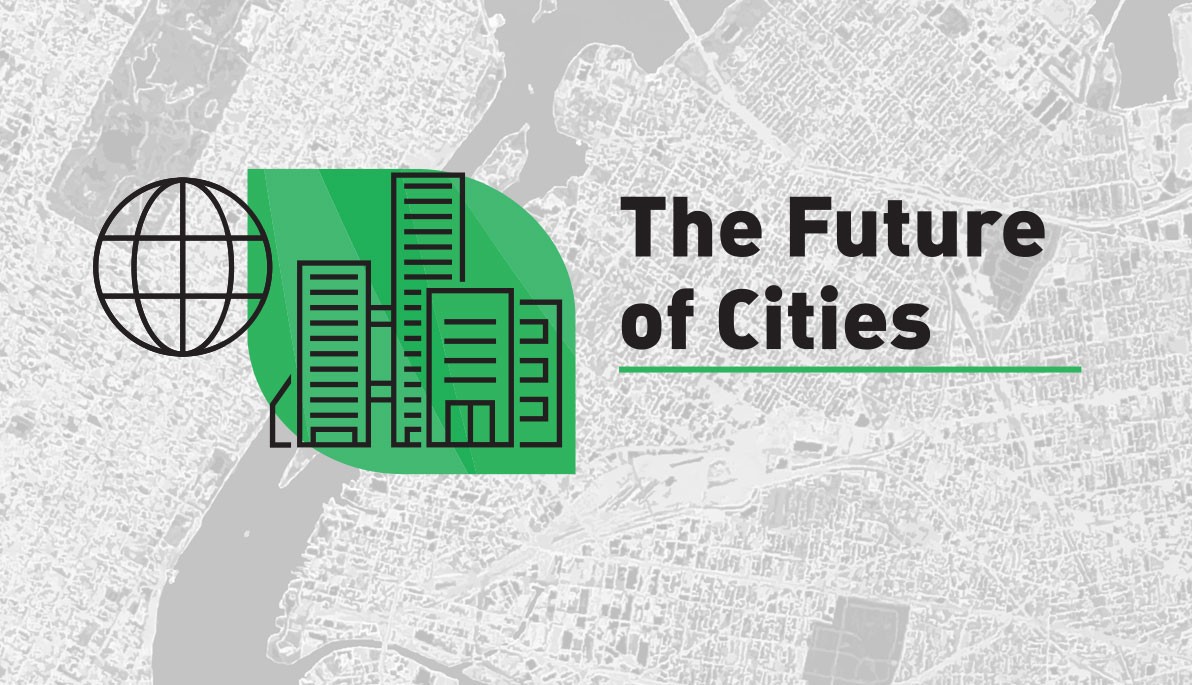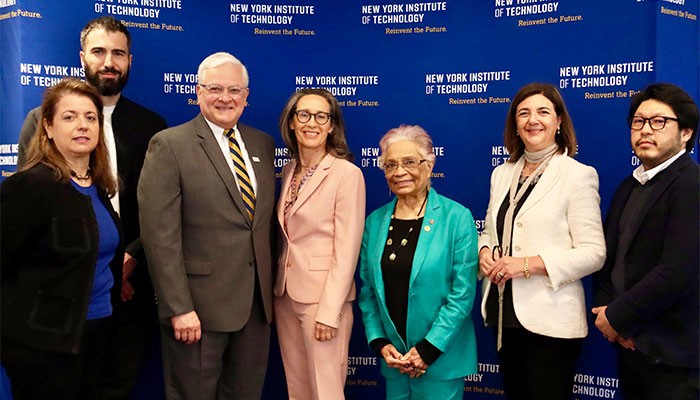
Towards an Inclusive City: Leave No One Behind
May 5, 2023
On April 27, the School of Architecture and Design and the Consulate General of Denmark in New York hosted The Future of Cities. The annual series aims to increase public awareness of critical global issues, including the future of cities, environmental sustainability, socio-political and economic challenges, urban regeneration, best sustainable practices in architecture and design, and urban planning for climate change adaptation. This year’s theme, Towards an Inclusive City: Leave No One Behind, is also in line with the theme of the UIA World Congress of Architects—Sustainable Futures, Leave No One Behind—which will take place in July in Copenhagen, Denmark.
President Hank Foley, Ph.D., and Dean of the School of Architecture and Design Maria Perbellini, M.Arch., Assoc. AIA, welcomed Ambassador and Consul General of Denmark in New York Berit Basse and the participating architects and theorists, including Sharon Egretta Sutton, Ph.D., FAIA, distinguished visiting professor of architecture at the New School; Daniel Baumann, design director and partner at Henning Larsen; and Theresa Genovese AIA, LEED AP, principal at CetraRuddy.
In her opening remarks, Perbellini said, “We will discuss today how we can proactively, and through collaborative and sustainable best practices, operate on multiple fronts as designers, educators, policymakers, and leading administrators in shaping a more balanced, equitable, and just future. At the School of Architecture and Design, where we educate the future generation of architects and designers, approaches to urban challenges and climate issues are supported by the understanding of the importance of our civic engagement and have become a critical part of our curricula.”
Following Perbellini, Basse gave a talk and asked what the architect’s role and responsibilities in creating truly diverse environments and how they can include and engage local communities in the development of their habitats. “The challenges that we face today are global, and sharing perspective forces us to think outside of the box,” she said. “Together, we are much better equipped to face the complexities of designing the cities of the future.”
In her presentation, Sutton encouraged people to use their skills to make a difference. “Make good trouble!” she said. “Organize people. We use architectural skills to draw but to make a movement, you have to have people behind you, so think about how you can use your architectural skills to change hearts and minds and not just design projects. We have to change hearts and minds.”

Pictured from left: Theresa Genovese, Daniel Baumann, President Hank Foley, Berit Basse, Sharon Egretta Sutton, Maria Perbellini, and Dongsei Kim
Sutton also presented her new book Pedagogy of a Beloved Commons, which talks about how low-income youth of color affect the commons of their neighborhood. She talked about a “place-based pedagogy that helps youth develop an awareness of the injustices in their surroundings, gain the capacity to address those injustices, and work hands-on to bring change.” Sutton concluded her talk by saying, “With these principles, struggling to negotiate difference, being inclusive in problem-solving, engaging the whole person, repairing relationships with one another and nature, and maintaining stability despite the turbulence, I propose that city makers help communities thwart the intolerances that create commons of disfranchisement, exclusion, and impoverishment of human spirit.”
Genovese began her talk, “Scales of Inclusivity: A Human Perspective,” by saying, “It [architecture] is not just about form making, but the idea of being the agent of change is very important, and you, as students, should start thinking now how you want to participate in that process.” Responding to a student’s question about how to make more inclusive cities, she encouraged students to be unrelenting. Genovese emphasized that an inclusive city is more important than ever. It is about the people and the community coming together rather than about form-making. Quoting Jane Jacobs’ The Death and Life of Great American Cities, she stated, “Cities have the capability of providing something for everybody, only because, and only when, everybody creates them.”
Baumann advised the students to be ambitious and dare to participate. He argued how a beach meadow, an area of biodiversity where many things come together, can become a symbol for seeing cities as a more productive, inclusive environment. (Beach meadows are coastal meadows influenced by the sea.) He also emphasized the importance of understanding inclusive design as a multitude of exercises, where the team-driven interdisciplinary design “we” process is privileged over the singular authorship of “I.” Baumann talked about several of his firm’s projects that illustrate how community input and designing as part of a cohort could contribute to inclusivity. He highlighted the challenge and productive nature of collaboratively designing with others to produce a public and open urban environment that ultimately contributes to building a more inclusive city.
Assistant Professor of Architecture Dongsei Kim, M.Des., M.S.AUD, moderated a panel discussion on how to build a more inclusive city.
Students, faculty, and external guests later joined a Q&A session. It concluded with a video and an invitation from Mette Lindberg, chief executive officer of the UIA World Congress of Architects, to join its gathering in July in Denmark.
Content for this article was contributed by Dongsei Kim and Susan Sternberg.
More Features

An Alumnus’ Commitment to the Environment
As an energy management graduate from New York Tech’s Vancouver campus, Jasdeep Gulati (M.S. ’22) is highly invested in educating people about environmental and climate sustainability.

Vancouver Faculty Win University-Sponsored Research Awards in New Program
The new Global Impact Research Grant (GIRG) program has been developed to keep Vancouver-based faculty connected to faculty and research projects being conducted on the university’s New York campuses.

Studying Climate Change One Degree at a Time
Junhua Qu (M.S. ’24) began her collegiate journey in Beijing. But, her interest in climate change took her to New York Tech’s Vancouver campus to study energy management.